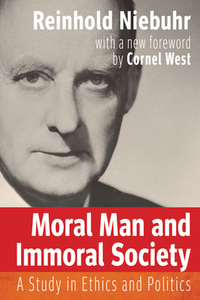You need to sign in or sign up before continuing.
Take a photo of a barcode or cover
A near work of pure genius that is eerily relevant to the moment we find ourselves in almost 100 years later, and a rare reminder of what Christian thought is capable of.
This was an interesting book. The basic premise is that the rules and reasonable expectations of individual morality and group morality are different. Niebuhr posits that morality is an individual pursuit that finds its highest expression in self-denial as an expression of recognizing the values and needs of others. This is essentially an expression of love. Group behavior, society in other words, finds its highest concern in the cause of justice. However, Niebuhr claims that perfect social justice is almost if not impossible to achieve. Individual morality cannot stand up to the interests of the group and compromises must be made. In addition, there are always interested parties in power who will use force to maintain their power (even non-coercive behaviors like propaganda and due process of law). Still, Niebuhr maintains that the struggle for justice is important, and - in the end - he insists that a vision of perfect social justice is required in order to motivate those who struggle to achieve even a partial approximation of that justice. Dense, but worth the read.
A book built on assumptions with which I cannot begin to imagine identifying—and Niebuhr did not even begin to justify those assumptions. And I don’t understand how such a book could be called theology.
This book was instrumental in my development as an adult human being. It is as relevant today as it was when it was written.
Finally got around to this one (by selecting it for a seminary assignment).
As a work of social ethics, it remains quite prescient, if somewhat bound to a 1930s optimism about the communist project around the world and despair at the role of markets in economic life.
The book is occasionally inflected with Scriptural references, but Niebuhr's argument is so empirical and outward-looking that you'd never really guess the book was written by a theologian and former pastor, though.
A work everyone thinking about political morality needs to engage with, but incomplete as a thoroughly Christian vision of community life.
As a work of social ethics, it remains quite prescient, if somewhat bound to a 1930s optimism about the communist project around the world and despair at the role of markets in economic life.
The book is occasionally inflected with Scriptural references, but Niebuhr's argument is so empirical and outward-looking that you'd never really guess the book was written by a theologian and former pastor, though.
A work everyone thinking about political morality needs to engage with, but incomplete as a thoroughly Christian vision of community life.
Can't be the final word, but an important work for Mennonites to wrestle with. Really sets the stage to read either JL Burkholder or JoHo Yo
This book is so interesting because it immobilizes you from every possible angle and then invites you to act. Does a great job of expositing the inability of religion to govern social conduct, but also shows how a materialist metaphysic denies the more sordid reality of human nature. Group identity is a necessary part of human existence but it also dredges up selfishness that would otherwise go unstirred, yet if you resign yourself to the unattainability of justice you'll be caught in a self fulfilling prophecy and social injustice will abound. Refreshing to read a treatment of human nature that contends with original sin without resolving the resulting tension by escaping into platitudes. Yes Christianity promises that Jesus has conquered sin and death, no that does not permit us to retreat from the reality of the current state of the world - cruciform theology should emphasize how Christ suffers with us even as he realized his ultimate victory in the resurrection.
Niebuhr analyzes the problem of human morality from the perspective of the individual, the group and the role that religion, idealism and reason play in it.
He reflects on the limits that human nature impose on morality and the value and risks of ignoring such limits.
There is a very detailed analysis of the justifications, conscious and unconscious, that are used by individuals of different social classes to justify its many injustices and maintain existing relations of power with ample historical examples.
Specific behaviors such as nationalism and violent and non-violent resistance are discussed at length.
Overall, this book is an interesting take on the timeless problem of social justice.
He reflects on the limits that human nature impose on morality and the value and risks of ignoring such limits.
There is a very detailed analysis of the justifications, conscious and unconscious, that are used by individuals of different social classes to justify its many injustices and maintain existing relations of power with ample historical examples.
Specific behaviors such as nationalism and violent and non-violent resistance are discussed at length.
Overall, this book is an interesting take on the timeless problem of social justice.
Published in 1932 "Moral Man and Immoral Society" continues to speak with wisdom and clarity to the issues humans face. While individuals may have a certain sense of morality, society exists on a very different plane. Hypocrisy and self-preservation stand at the heart of human society, and humans are often compromised by it.
While not everything in this book transcends time, it is amazingly prescient about the political troubles we face. One of the issues he handles head on is our desire to see ourselves as morally pure, and that our actions are morally pure. But sin taints us. The need we have is forgiveness and humility, for we all share a common dilemma. This is illustrated in Niebuhr's discussion of coercion near the end of the book. Coercion of some form will exist in society. Nonviolent coercion can be highly effective, but one must recognize that even nonviolent coercion can cause property damage and harm to others. Think of the effect of a boycott on workers who make a product. Consider an embargo -- the people of a nation facing a blockade may find themselves suffering and even dying as a result.
Whether one is a Niebuhrian or not this is a must read.
Niebuhr is a theologian and an ethicist. He deals with matters of faith in his works, though this is less overtly religious than other works. Nonetheless wisdom drawn from Christianity pervades the book.
Read it again in 2017 -- still a must read!
While not everything in this book transcends time, it is amazingly prescient about the political troubles we face. One of the issues he handles head on is our desire to see ourselves as morally pure, and that our actions are morally pure. But sin taints us. The need we have is forgiveness and humility, for we all share a common dilemma. This is illustrated in Niebuhr's discussion of coercion near the end of the book. Coercion of some form will exist in society. Nonviolent coercion can be highly effective, but one must recognize that even nonviolent coercion can cause property damage and harm to others. Think of the effect of a boycott on workers who make a product. Consider an embargo -- the people of a nation facing a blockade may find themselves suffering and even dying as a result.
Whether one is a Niebuhrian or not this is a must read.
Niebuhr is a theologian and an ethicist. He deals with matters of faith in his works, though this is less overtly religious than other works. Nonetheless wisdom drawn from Christianity pervades the book.
Read it again in 2017 -- still a must read!
There is a lot in this book, and much of it is hardheaded, cool, and practical. While certain themes are repeated throughout, it seemed like every page had some new and provocative insight that challenged preconceived notions (he criticizes Gandhi at one point, and fairly, I might add). And though the book seems dated, I thought its age allowed the reader to judge the accuracy of some of Niebuhr's claims about, what was then, the future. Even then, this book has lost none of its relevance.

